They guard. They herd. One even weeds. Meet the nine hardworking canine companions - and their humans - who wagged their way into our hearts.
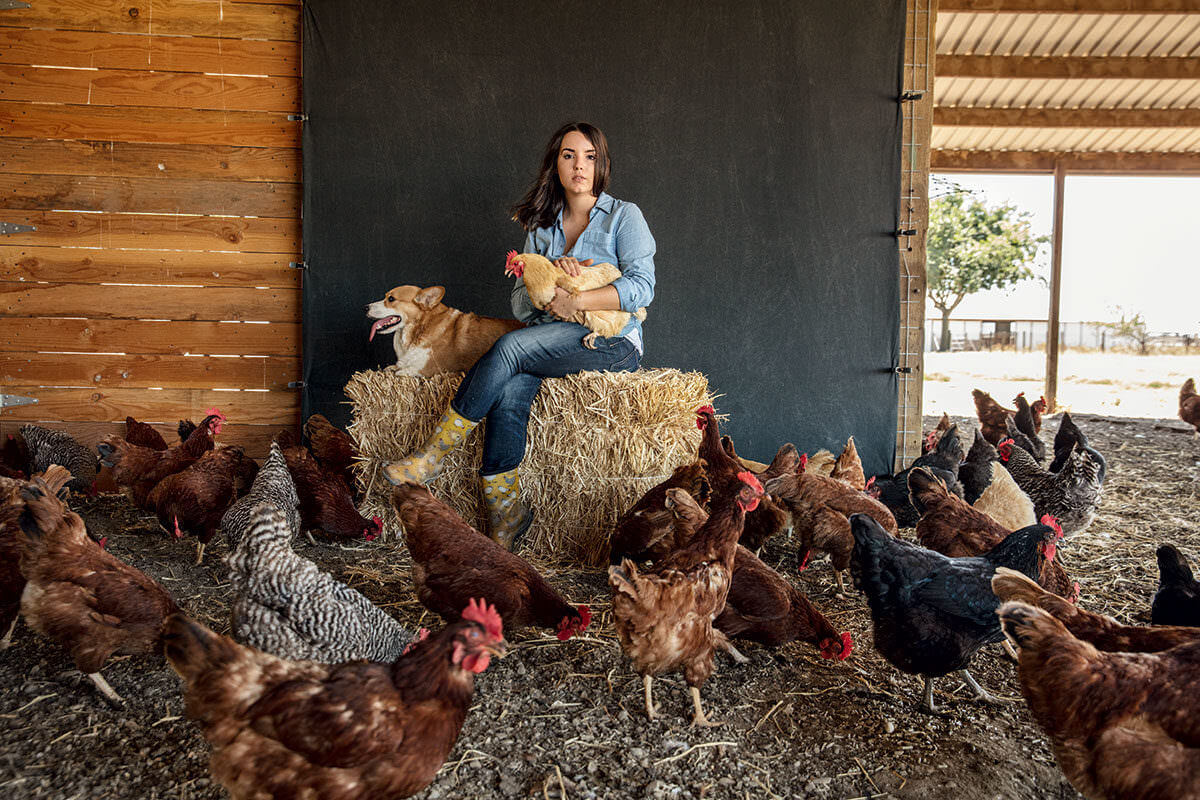
IF DOG IS MAN’S BEST FRIEND, then a farm dog is also his, or her, business partner, pest-control consultant, security guard, even sales rep. Just ask Stan Miklis, who grows organic herbs and flowers in Texas. His miniature Australian Shepherd hams it up to charm farmers market customers out of their cold, hard cash. She’s also stolen Miklis’ warm, soft heart. “I’m lucky that Trophy loves me,” he says. “I’d die without her.”
This kind of rare interspecies bond can be traced back millennia to the moment when the first curious wolf started slinking around a human camp, intuiting that a semi-friendly stance might garner more food scraps than bared teeth. From the get-go, our ancestors shared certain commonalities with canines (both were carnivores who hunted in groups by daylight) that eventually developed into a completely codependent relationship.
It’s safe to say that agriculture – hell, civilization – wouldn’t exist without dogs. They helped us figure out how to domesticate, herd, and protect large numbers of livestock. Over time, we bred Canis lupus familiaris to bring forth characteristics suited to specific tasks. The Dachshund’s long, low body lends itself to dispatching tunneling prey, such as badgers and moles. Massive Maremma Sheepdogs and Great Pyrenees guard vulnerable sheep and goats against attack. Collies, corgis, and shepherds live to corral, well, everything.
Now that we’ve evolved past purebreds to embrace an inclusive, pro-rescue approach, almost any mutt can become the ultimate farm dog. When Jeremy Duckett and Lailand Oberschulte took in a Red Heeler”“Whippet mix who had been tossed from a moving car, the couple had no clue that Ally Mai would serve as a surrogate mother to every baby piglet and chick on their California ranch. “She is,” says Duckett, “the best dog ever.”
Miklis might beg to differ. Ditto the other fine folks featured here, plus nearly 150 others who responded to our social media request for farm dogs worth profiling. These people hounded us, shall we say, sending in photos and tributes, each attesting to the superiority of a certain four-legged friend. And therein lies the undeniable truth about these canny creatures, capable of connecting with humans on a deeply personal level: The best dog ever is the one curled up nearby as you read this.
Don’t see your favorite breed, or mutt, on these pages? Then make sure it appears on our Instagram feed! Use #IAmAModernFarmDog when posting pics of your pooch.
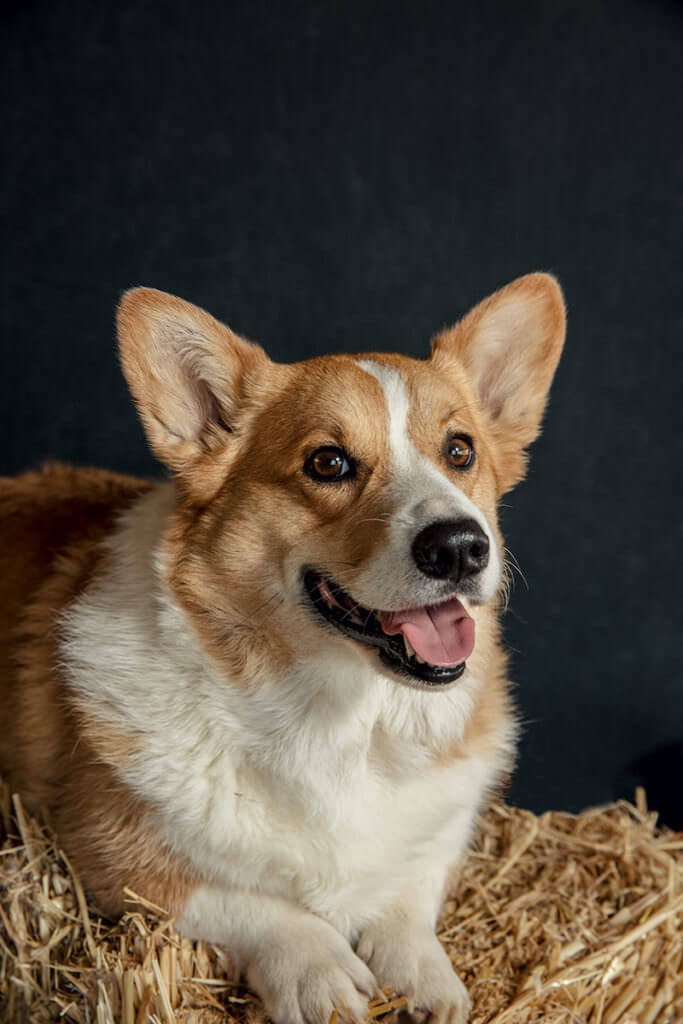 NAME: Winston
NAME: Winston
BREED: Pembroke Welsh Corgi
OWNED BY: Anjelica Locke Green, Green Acres Farmstead
WHERE: Hilmar, CA
To appreciate what Anjelica Locke’s 3-year-old corgi accomplishes on any given day, it helps to have experienced the farce of chasing a bird. “There’s a joke among chicken keepers that the average chicken runs nine miles an hour and the average person runs eight,” says Locke, 27. “I’ll finally grasp a leg, and the hen turns wacko, flying up in my face and contorting into this alligator death roll. So I instinctively let go, though I know she’s 100 percent playing me.”
Winston is wiser to such melodramatic escape tactics. Should one of the farm’s pasture-raised Rhode Island Reds or Buff Orpingtons step out of line, he effortlessly intervenes, pinning the AWOL target by resting his chest on her back. “The birds freeze,” Locke marvels. “I swear, they respect him more than me.”
“People often discount corgis,” she says of the breed, best known as the Queen of England’s preferred palace pets. “They’re actually great herders, gentler with poultry than loud, lively collies.” In the beginning, Locke feared that Winston – a gift from her husband, Sean – might kill a hatchling. “Chicks make a borderline squeak-toy noise, but he’s never harmed a bird. I wish I could say that’s because I’m an excellent dog trainer. Truth is, Winston deserves the credit.”
ABOUT THE BREED
ROLE ON THE FARM: Herder
COUNTRY OF ORIGIN: Wales
TEMPERAMENT: High energy, needs tasks or other physical outlets
POTENTIAL HEALTH ISSUES: Hip dysplasia, eye disease
AVERAGE WEIGHT: 24”“30 pounds
LIFE EXPECTANCY: 12”“13 years
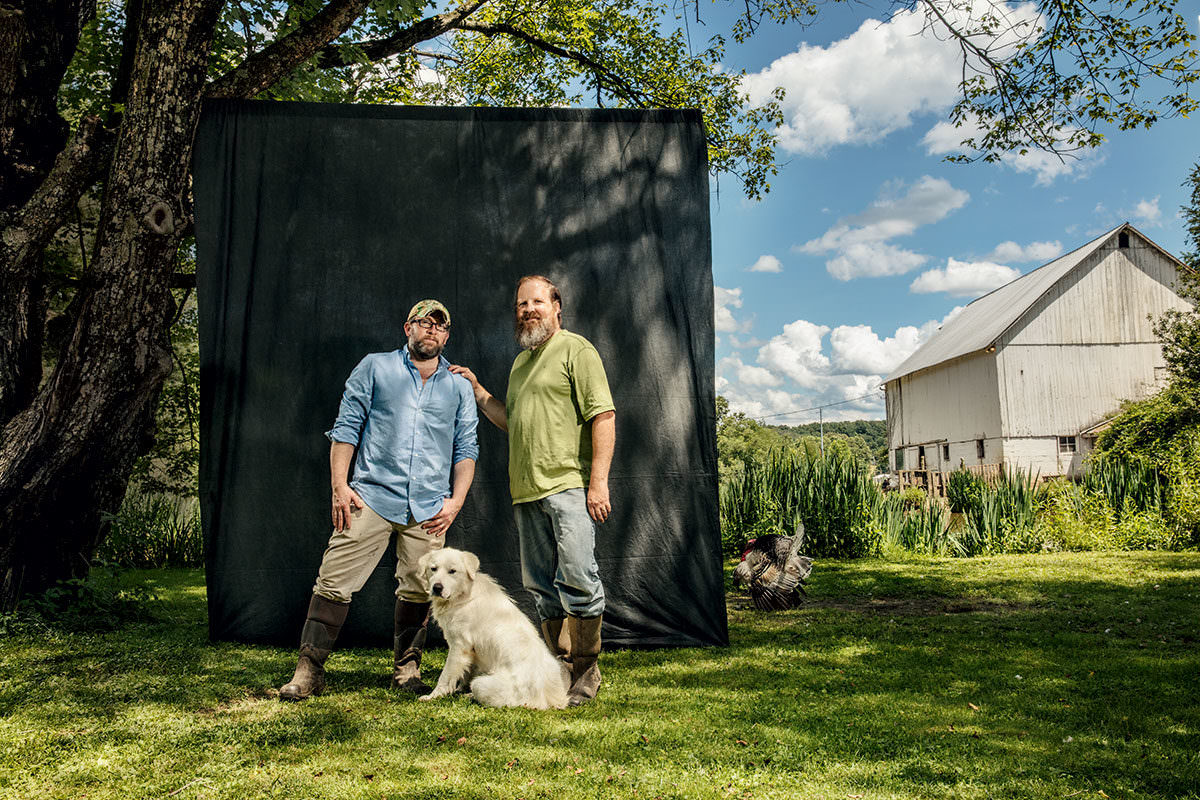
NAME: Gwynavyr
BREED: Great Pyrenees
OWNED BY: Chad Snelling (left) and Jeff Wince
WHERE: Tilton Hollow Farm, Frazeysburg, OH
“I was dragged kicking and screaming to this farm,” admits Chad Snelling. “I wanted to live in New York City, not Frazeysburg, the dirt pile where dreams go to die.” His husband, Jeff Wince, clearly won that fight. “The first time Jeff came home with a goat,” recalls Snelling, “I thought the horned beast might maim me.” Instead, it kissed him on the cheek. That goat led to another and another, and eventually, explains the 48-year-old, “I realized, ‘I’m happy. My life makes me happy.’”
“Two guys and a few goats isn’t all that interesting,” Snelling says. “But two guys, 27 goats, 70 ducks, 50 chickens, 12 turkeys, six sheep, and a random alpaca? Now that’s a story.” The alpaca alone yields a colorful tale: “Jeff’s stepdad, a good old boy from Arkansas, was at a livestock auction. He remembered that we were in the market for a llama and figured: Llama? Alpaca? Same deal.”
Last year, the couple began hearing coyotes at night, just as a dog-breeding neighbor offered up a Great Pyrenees puppy. They gave her a mythical name with an obscure spelling. “The goats despised Gwynavyr initially and plotted her demise,” says Snelling. Before long, however, the two species managed to develop a shared language. Now 19 months old, Gwynavyr stations herself at the barn door, between the herd and the larger world, and nudges kids toward their mothers.
According to Snelling, Wince has proven harder to train. “He sneaks the dog into the house. But she keeps her eyes glued to the window. She longs to be out with the goats. It’s where she belongs.”
ABOUT THE BREED
ROLE ON THE FARM: Livestock guardian
COUNTRY OF ORIGIN: France
TEMPERAMENT: Mellow, independent
POTENTIAL HEALTH ISSUES: Hip dysplasia
AVERAGE WEIGHT: 85”“100 pounds
LIFE EXPECTANCY: 10”“12 years
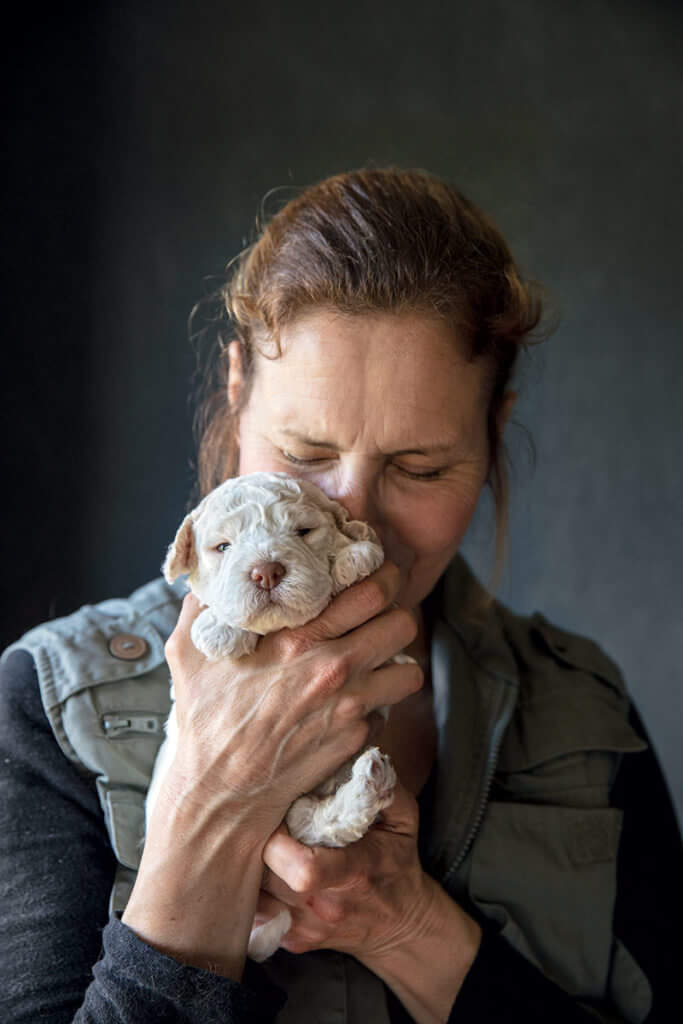 NAME: Red
NAME: Red
BREED: Lagotto Romagnolo
OWNED BY: Lisa Brosnanthe
WHERE: Truffle Underground, Salem, OR
When Lisa Brosnan’s career as an urban planner took her from Nevada to the Pacific Northwest, she figured she might as well make the most of the region’s wet, gloomy climate by doing a little truffle hunting on the side. Five years later, that decision has given rise to Red, the adorable fur ball above, recently born to Brosnan’s beloved Lagotto Romagnolo Sophia, whose father served as the breed’s standard-bearer for the American Kennel Club.
“They started out as water retrievers in northern Italy,” Brosnan explains. “But after the region’s marshes were drained to create farmland in the 1800s, the animals lost their purpose.” Though Lagottos still boast webbed feet, it’s the dogs’ keen sense of smell that eventually earned the breed its keep – sniffing out truffles, as well as bombs, drugs, and bedbugs.
The puppies’ curiosity emerges early. “The best part of raising babies is that I get to train them from day one,” says the 55-year-old. “I’ve been rubbing truffle oil on Sophia’s belly so Red and her siblings will associate the aroma with good things. Then I sprinkle it on a tennis ball before we play fetch. Soon I’ll start burying scented objects near the Douglas firs.”
Turns out, there’s an ecological benefit to pressing canines into gourmet foraging service. “Some hunters rake the ground indiscriminately, damaging and exposing the tree’s roots,” Brosnan says. “Dogs pinpoint the exact location of ripe truffles, so I can harvest them with a spoon and avoid disrupting the forest floor.”
ABOUT THE BREED
ROLE ON THE FARM: Truffle hunter
COUNTRY OF ORIGIN: Italy
TEMPERAMENT: Moderate energy, curious, happy
POTENTIAL HEALTH ISSUES: Benign familial juvenile epilepsy
AVERAGE WEIGHT: 24”“35 pounds
LIFE EXPECTANCY: 15”“17 years
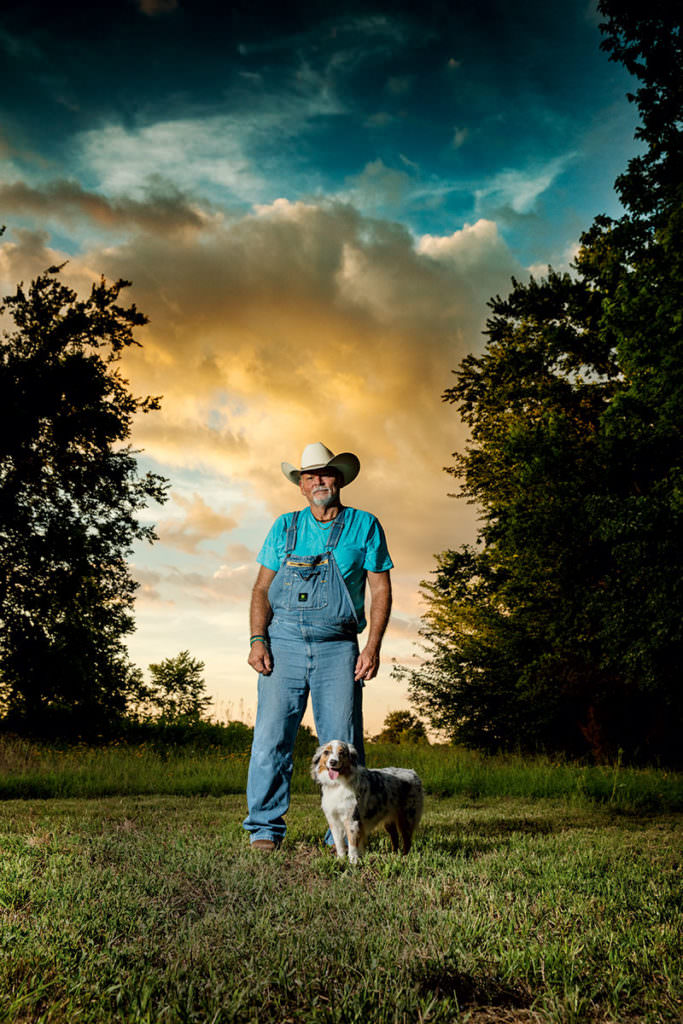 NAME: Trophy
NAME: Trophy
BREED: Miniature Australian Shepherd
OWNED BY: Stan Miklis
WHERE: Caliper Farm, Market Royse City, TX
Don’t let that hard-boiled cowboy persona fool you. Instead of roping cattle, Stan Miklis cossets potted organic herbs and flowers on his 100 Texas acres. As for the miniature Australian Shepherd by his side, the only things that little lady herds are customers and their pocketbooks – straight to Miklis’ booths at five weekly Dallas-area farmers markets.
Trophy, age 4, employs all kinds of showy sales tactics to keep the cash flowing in. “She jumps through Hula-Hoops and dances on her hind legs,” says Miklis. “She’s a well- known star around here. Some folks come to the markets just to see her. Even from a distance, she recognizes the people who always bring treats.”
The 60-year-old is man enough to admit that he prefers a lap-size dog. “She goes everywhere with me,” Miklis explains. “We’re a one-man, one-dog operation.” But he becomes a tad more reluctant when asked about her name. “This is really embarrassing. I decided to get a dog instead of a trophy wife. That’s her full name: Trophy Wife. It really was the better decision.”
ABOUT THE BREED
ROLE ON THE FARM: Herder
COUNTRY OF ORIGIN: United States
TEMPERAMENT: High energy, eager to please
POTENTIAL HEALTH ISSUES: None particular to breed
AVERAGE WEIGHT: 20”“40 pounds
LIFE EXPECTANCY: 12”“13 years
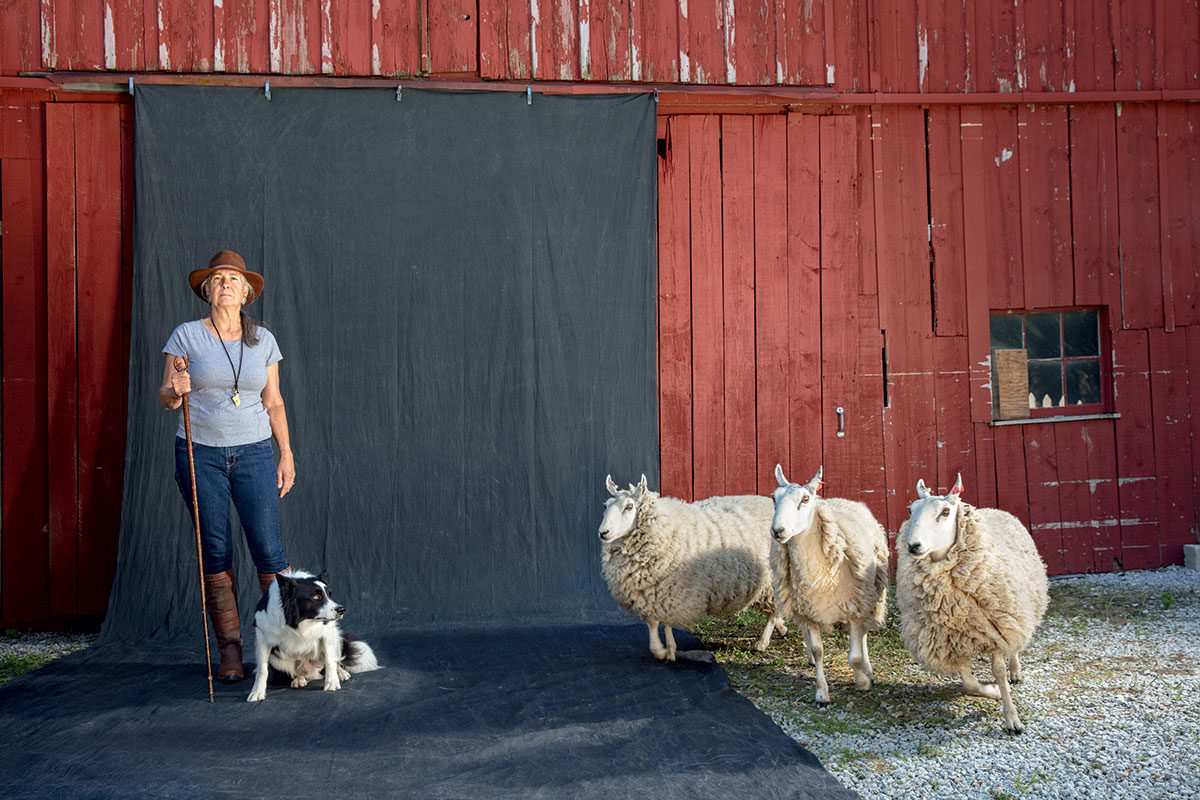
NAME: Boz
BREED: Border Collie
OWNED BY: Connie Brannen
WHERE: Fair Wether Farm, Versailles, KY
Nobody at the American Kennel Club gives a hoot about the color of a Border Collie’s coat. And in performance competitions, broken teeth and grisly scars incurred in the line of duty don’t affect the dogs’ scores a bit.
“They’re not bred for anything other than work ethic and ability, so that’s why there’s no cookie-cutter look,” says Connie Brannen. “Pretty is as pretty does.”
She should know. She’s been training Border Collies ever since taking in an especially high-strung one nearly two decades ago. “We weren’t bonding well, and a friend said that putting her on sheep would boost her confidence and help us connect,” Brannen recalls. “The first time I tried it, I was hooked.”
For the past four and a half years, a boy named Boz has served as her constant companion. “I’m 60 years old, and I’ve had a lot of dogs,” she says. “But Boz is special. I took a picture of him when he was a puppy, and it’s almost like there’s a ray of sunshine coming out of his butt. He’s still like that: happy, friendly, never met a stranger.”
Since selling her 21-acre Kentucky farm in May, Brannen has been crisscrossing the country with Boz to participate in sheepdog trials. He excels at maneuvers that involve steering a flock into a variety of configurations without making a ruckus or causing the livestock distress. And he’s up against some pretty stiff competition. Border Collies are often cited as the most intelligent dog breed (a 12-year-old called Chaser in Spartanburg, South Carolina, boasts a vocabulary of over 1,000 words).
The word “collie” purportedly comes from the Celtic term for useful, an etymological fun fact Brannen deems apropos. “Boz often looks me in the eyes as if to say, What do you need, boss?”
ABOUT THE BREED
ROLE ON THE FARM: Herder
COUNTRY OF ORIGIN: Great Britain TEMPERAMENT: High energy, intelligent, athletic
POTENTIAL HEALTH ISSUES: None particular to breed
AVERAGE WEIGHT: 25”“55 pounds
LIFE EXPECTANCY: 10”“17 years
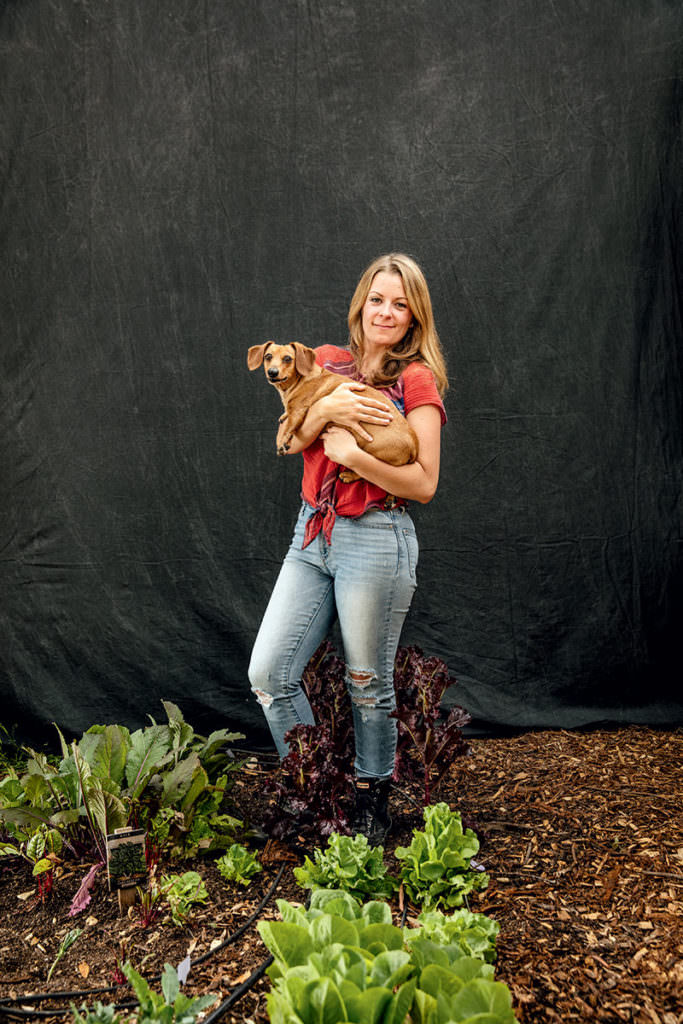 NAME: Riley
NAME: Riley
BREED: Daschund
OWNED BY: Ashley Norfleet
WHERE: Norfleet Family Farm, Portola Valley, CA
This 10-year-old doxie spent the first half of her life in San Francisco. “She hated the city and cowered every time I grabbed the leash,” says Ashley Norfleet of her car-, crowd-, and sidewalk-phobic pup. The dog’s disposition changed radically, however, as soon as Ashley and her husband, Chase, moved 40 miles south to begin homesteading on three acres. “Riley blossomed,” Ashley explains. “She stepped up to become our farm dog.”
Dachshunds were originally developed to tunnel for vermin, and Riley indeed keeps an eye out for moles. But that’s not all. “She digs on command!” exclaims Ashley, 32. “When I need a hole for a fruit tree and point to the ground, she’ll keep going until I tell her to stop. And you should see her in weed-whacker mode – tearing out coyote brush with her teeth.”
If anything, Riley tends to overdo it, exacerbating the back problems common to the breed. In 2013, Ashley found her pet paralyzed and rushed her into a risky surgery. “She made a miraculous recovery and hasn’t slowed down one bit,” Ashley says. “That tiny girl has a bigger heart than a Great Dane. Look, I’m devoted to my other dogs, and I try not to say this out loud, but yes, Riley’s definitely my favorite.”
ABOUT THE BREED
ROLE ON THE FARM: Vermin hunter
COUNTRY OF ORIGIN: Germany
TEMPERAMENT: Spunky, intelligent
POTENTIAL HEALTH ISSUES: Spine injuries, particularly if overweight
AVERAGE WEIGHT: 16”“32 pounds
LIFE EXPECTANCY: 12”“16 years
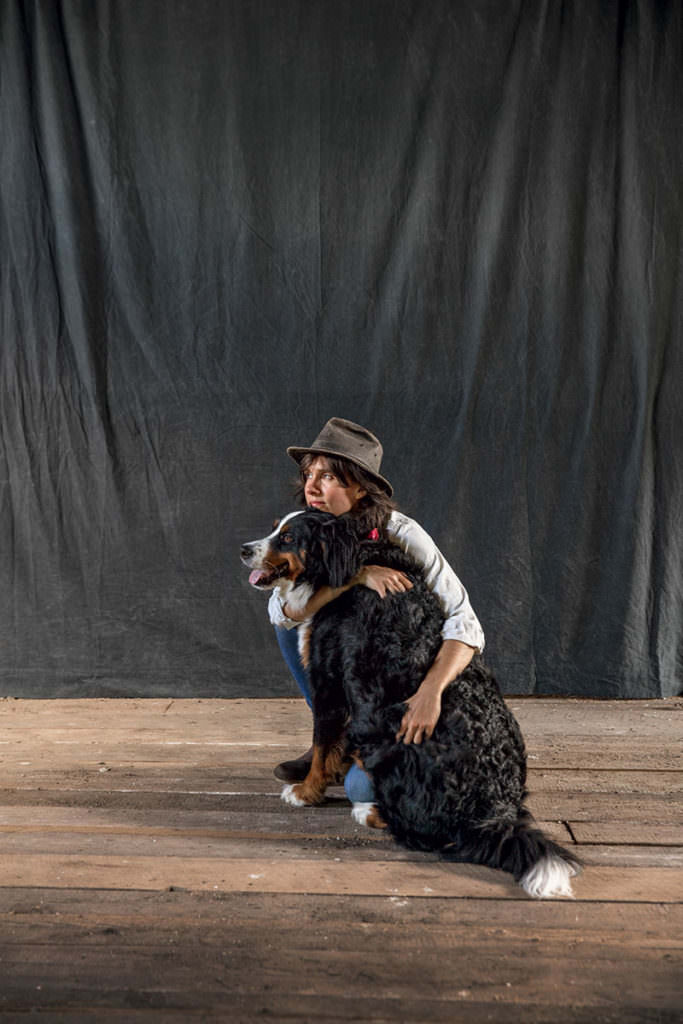
NAME: Daisy
BREED: Bernese Mountain Dog
OWNED BY: Jess Ludwicki
WHERE: Echo Orchard and Farm, Hamden, NY
Jess Ludwicki and her fiancé, Steve Jewett, harbor big dreams for their 32 acres in upstate New York. “The fantasy is that we’ll have a U-pick operation with hundreds of apple, peach, pear, and cherry trees, a stand selling eggs and produce, and possibly Airstreams kitted out for farm-stay guests,” Ludwicki says.
Once upon a time, the couple’s vision also included strapping their Bernese Mountain Dog, Daisy, up to a harness and putting her to work. “These dogs are meant to pull carts and can lug up to ten times their own weight,” explains Ludwicki, 34. “People think of farming as a series of heavenly tasks, like collecting blueberries, but so much of it involves hauling 50-pound bags of chicken feed or mulch.”
Unfortunately, Daisy exhibited early signs of the hip dysplasia that sometimes affliicts these gentle giants, so she had to scale back. Way back. Today, the 3-year-old ferries clippers and water bottles in a canvas backpack tied around her waist and hunts pesky voles, whose gnawing can easily wipe out an orchard’s worth of rootstock.
“We’re fairly new farmers, and we’re learning,” Ludwicki says. Already, the former Brooklynite has swallowed enough hard lessons about best-laid agricultural plans to take a que serÁ¡, serÁ¡ approach to her dog’s condition. One sign that this canine-human relationship was meant to be: “A month or two after we named Daisy, hundreds of beautiful oxeye daisies popped up that we had no idea were here.”
ABOUT THE BREED
ROLE ON THE FARM: Drafter
COUNTRY OF ORIGIN: Switzerland
TEMPERAMENT: Dependent, low energy
POTENTIAL HEALTH ISSUES: Hip dysplasia
AVERAGE WEIGHT: 70”“120 pounds
LIFE EXPECTANCY: 6”“8 years
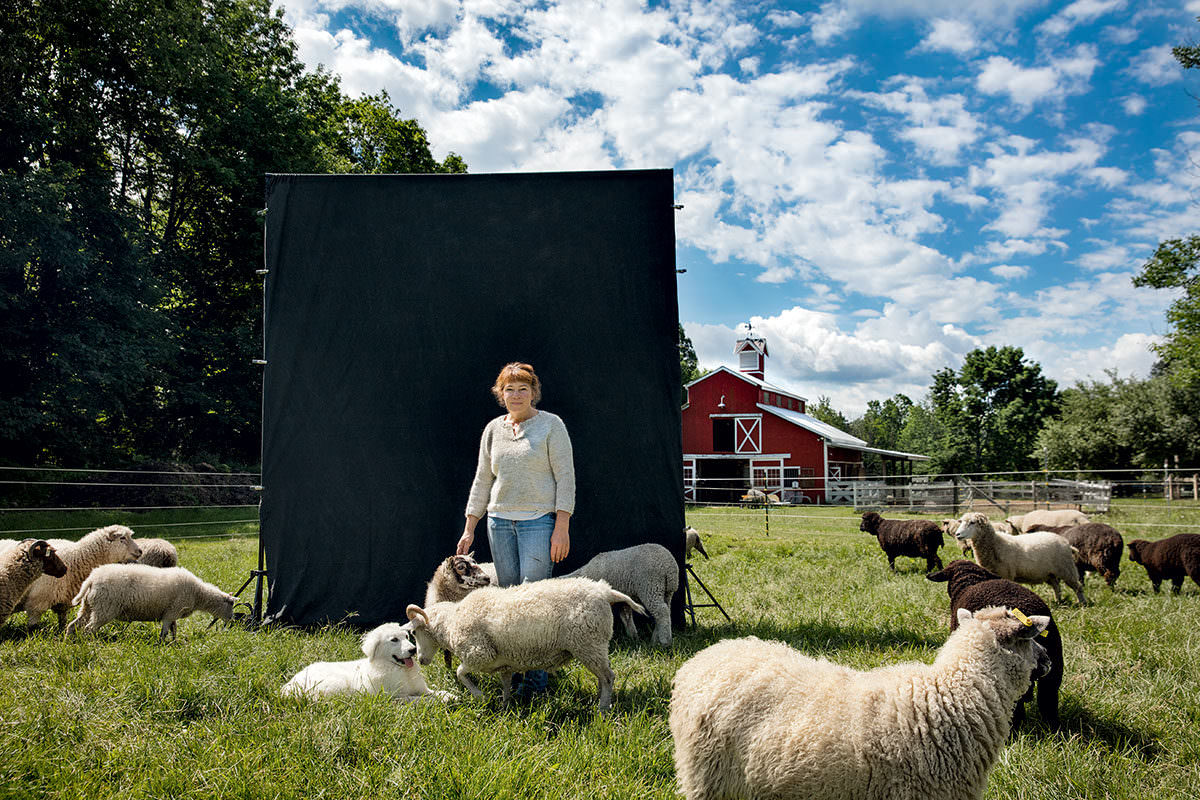
NAME: Joan
BREED: MAREMMA SHEEPDOG
OWNED BY: Tammy White
WHERE: Wing and a Prayer Farm, Shaftsbury, VT
Fiber farmer Tammy White tries to do it all on her 20 acres: shear the sheep, muck the stalls, deliver breach births, even sell homemade pies off her porch on Fridays. “For a while, I was my own guard dog, running outside in my PJs if I heard a threat,” the superwoman says. Last summer, White began night-grazing her Angora goats and merino sheep in order to let them linger in the cooler air. That decision, alas, took its toll. “I was so concerned about predators, I slept with one ear open,” the 52-year-old remembers. “I’m kind of a helicopter mom.”
A Maremma Sheepdog she found via the Vermont Sheep and Goat Association restored the peace at her Wing and a Prayer Farm this past March. When White visited the litter, she turned to mush. “Their cuteness was debilitating,” she says. Nevertheless, one girl stood out. “She didn’t vie for attention. She was subdued and off on her own. In some ways, she was the least endearing, but I was inexplicably drawn to her.”
White named this latest addition to her menagerie Joan – after the 15th-century shepherdess Joan of Arc – and sure enough, the dog always posts herself stoically next to the livestock. “There’s not a stitch of the puppy in her. It takes real prodding to get her to cut loose,” says White. “At times, I worry that Joan is too serious. That’s probably me projecting, though.”
ABOUT THE BREED
ROLE ON THE FARM: Livestock guardian
COUNTRY OF ORIGIN: Italy
TEMPERAMENT: Independent, low energy, courageous
POTENTIAL HEALTH ISSUES: Hip dysplasia
AVERAGE WEIGHT: 60”“100 pounds
LIFE EXPECTANCY: 11”“13 years
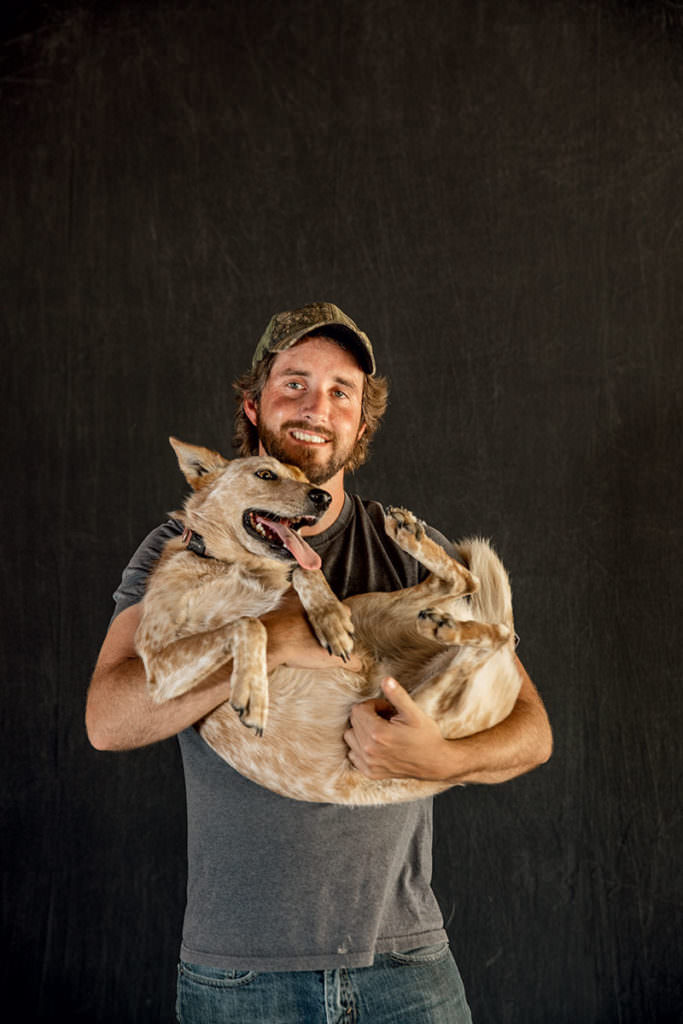
NAME: Ally Mai
BREED: Red Heeler-Whippet Mix
OWNED BY: Jeremy Duckett
WHERE: Rosebud Heritage Farms, St. Helena, CA
Jeremy Duckett and Lailand Oberschulte always root for the underdog. Every heritage hog, hen, and turkey on their Napa Valley farm has been deemed endangered or at risk by The Livestock Conservancy. So, two years ago, after seeing a Facebook post about a heeler mix who’d been dumped from a moving car, the couple didn’t hesitate to adopt her.
“Because Ally Mai had been abandoned, she could have been shy or angry,” says Duckett. “Instead, she’s grown into an amazing dog.” Emphasis on grown into. “In the beginning, she was a bit high energy,” the 34-year-old admits. “A bit of a chewer. We lost a couch.”
These days, the pooch has better things to do. Like most rescues, Ally Mai was spayed by the organization that placed her, but it didn’t curb her maternal instinct. Explains Oberschulte, 28: “If there are newborns, whether piglets or chicks – even our kitten – she acts like the mommy. I’ve never seen an animal so focused on babies in particular.”
That skill set comes in handy more often than one might think. Last February, when a sow named Chrysanthemum showed zero interest in her offspring, the bottle-fed Ham Solo spent his first few weeks under Ally Mai’s watch. “They slept snuggled together,” Oberschulte says. “I think he’s still convinced she’s a pig.” Adds Duckett: “Ally just wants to love and be loved.”
ABOUT THE BREEDS
When Duckett and Oberschulte had a DNA test done on Ally Mai, they learned that she’s a mix of Red Heeler and Whippet. The former, born to herd, originated in Australia; they tend to be affectionate, high-energy dogs that weigh about 40 pounds and live approximately 14 years. Whippets, natural vermin hunters, hail from Great Britain; calm and playful, they can reach between 25 and 40 pounds and 12 to 15 years of age. There are no health issues particular to either breed.!